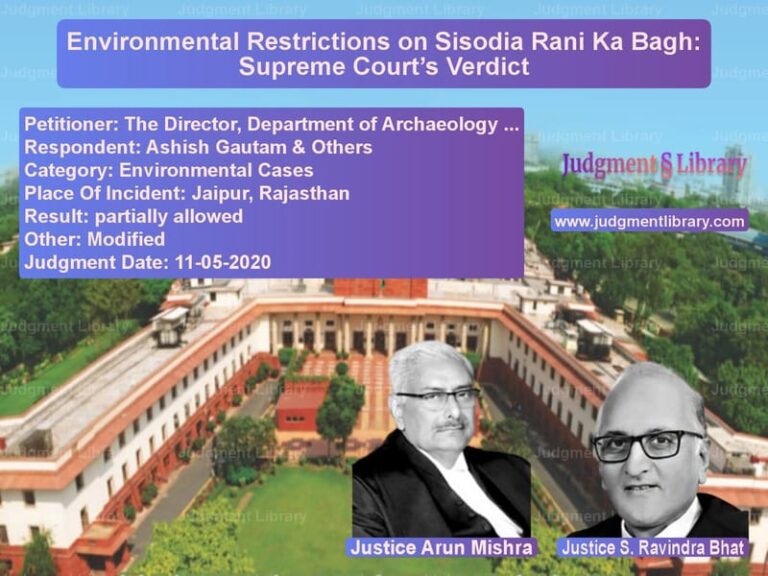Supreme Court Upholds Customs Duty Exemption for Advance License Holders
The case of M/S Granules India Ltd. vs. Union of India involved a significant dispute regarding customs duty exemption under the Advance License Scheme. The Supreme Court was called upon to determine whether an importer was liable to pay customs duty when an exemption had initially been granted but was later withdrawn via an amendment.
Background of the Case
Granules India Ltd. imported 96 tons of ‘Acetic Anhydride’ under an Advance License in December 1993 through the Inland Water Container Depot, Hyderabad. At the time of obtaining the license, the import was governed by specific notifications:
- Notification Nos. 203/1992 and 204/1992 (dated May 19, 1992) – Allowed duty-free imports under the Advance License Scheme.
- Notification No. 183/1993 (dated November 25, 1993) – Withdrew the exemption, making imports liable for customs duty.
- Notification No. 105/1994 (dated March 18, 1994) – Issued to clarify that imports under advance licenses issued before the November 1993 amendment would still enjoy the exemption.
Despite this clarification, the Customs Department issued a demand notice to Granules India Ltd., arguing that since the imports took place after November 25, 1993, the company was liable to pay customs duty.
Arguments by the Petitioner (Granules India Ltd.)
The petitioner put forth the following arguments:
- The company’s imports were made under an advance license that was issued before the exemption was withdrawn, thus retaining the original duty-free status.
- The March 1994 notification explicitly clarified that exemption would still apply to such imports.
- The Customs Department had allowed duty-free clearance for other similar imports under the same license, establishing a precedent.
- The High Court failed to correctly apply the principles laid down in Shri Krishna Pharmaceuticals Ltd. vs. Union of India, a case in which a similar demand was set aside.
Arguments by the Respondent (Union of India)
The Union of India, defending the Customs Department’s position, made the following contentions:
- Since the import took place after the withdrawal of the exemption in November 1993, the company was legally bound to pay customs duty.
- The clarificatory notification of March 1994 could not be applied retrospectively to imports made post-amendment.
- The petitioner had failed to present the clarificatory notification in its original writ petition and, therefore, was not entitled to claim benefits at a later stage.
Supreme Court Observations
The Supreme Court examined the legislative intent behind the exemption and analyzed the impact of the clarificatory notification. Key observations made by the Court included:
- The exemption was withdrawn in November 1993; however, the March 1994 notification aimed specifically to address the difficulties faced by advance license holders.
- The Customs Department had already granted duty-free clearance for other consignments imported under the same license, highlighting an inconsistency in the application of rules.
- Denying the exemption solely on the ground of the importation date was arbitrary and violated the principle of fair trade practices.
- The government could not deny the benefit of a valid exemption merely due to procedural lapses or bureaucratic inconsistencies.
Key Legal Precedents Considered
The Supreme Court relied on several past rulings to reinforce its decision:
- Shri Krishna Pharmaceuticals Ltd. vs. Union of India – Established that benefits granted under an advance license cannot be withdrawn retrospectively.
- Oswal Agro Mills Ltd. vs. Collector of Central Excise – Held that tax exemptions should be interpreted in favor of the taxpayer unless explicitly revoked.
- Union of India vs. Tata Chemicals – Confirmed the validity of clarificatory notifications to ensure fair treatment of taxpayers.
Final Judgment
Based on its findings, the Supreme Court ruled in favor of Granules India Ltd. and issued the following orders:
- The customs duty demand against the company was quashed.
- The clarificatory notification of March 1994 was deemed applicable to all advance license holders, including the petitioner.
- The High Court’s order, which upheld the customs duty demand, was set aside.
- The Customs Department was instructed to refund any customs duty already collected from the petitioner.
Conclusion
This ruling reaffirmed the principle that clarificatory notifications are meant to ensure fair and just implementation of laws. The Supreme Court emphasized that procedural lapses should not be used to deny substantive justice, particularly when government agencies were fully aware of the exemptions applicable to advance license holders. The judgment serves as a significant precedent for future cases involving duty exemptions and the retrospective application of clarificatory notifications.
Petitioner Name: M/S Granules India Ltd..Respondent Name: Union of India.Judgment By: Justice Navin Sinha, Justice Krishna Murari.Place Of Incident: Hyderabad.Judgment Date: 23-01-2020.
Don’t miss out on the full details! Download the complete judgment in PDF format below and gain valuable insights instantly!
Download Judgment: MS Granules India L vs Union of India Supreme Court of India Judgment Dated 23-01-2020.pdf
Direct Downlaod Judgment: Direct downlaod this Judgment
See all petitions in Customs and Excise
See all petitions in Tax Refund Disputes
See all petitions in Judgment by Navin Sinha
See all petitions in Judgment by Krishna Murari
See all petitions in allowed
See all petitions in Quashed
See all petitions in supreme court of India judgments January 2020
See all petitions in 2020 judgments
See all posts in Taxation and Financial Cases Category
See all allowed petitions in Taxation and Financial Cases Category
See all Dismissed petitions in Taxation and Financial Cases Category
See all partially allowed petitions in Taxation and Financial Cases Category







